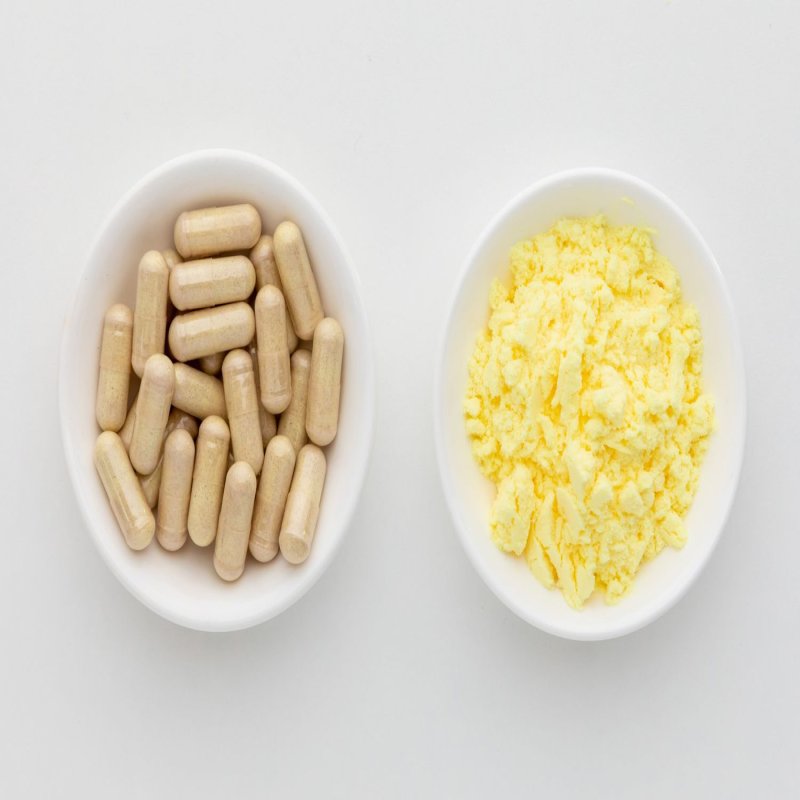
Alpha-lipoic acid (ALA) is a natural compound that is produced by the body and found in certain foods, such as spinach, broccoli, and organ meats. It is a potent antioxidant that has been studied for its potential health benefits. Your body produces ALA, a fatty acid that occurs naturally. Aerobic metabolism is the process through which blood sugar (glucose) is converted into energy using oxygen. As an antioxidant, ALA prevents dangerous substances called free radicals from harming cells genetically. In this article, we'll explore the uses and supplements of ALA, as well as its potential benefits and side effects.

Uses of ALA
- Antioxidant: ALA is a strong antioxidant that can aid in defending the body against harm brought on by free radicals. Free radicals are chemicals that have the potential to harm cells and have a role in the emergence of chronic illnesses like cancer, heart disease, and Alzheimer's disease.
- Neuroprotective: For its potential to have neuroprotective properties, ALA has been researched. It can cross the blood-brain barrier and might be able to prevent oxidative stress, inflammation, and other causes from harming the brain. According to studies, ALA may be helpful in the treatment of diseases like Parkinson's disease, multiple sclerosis, and Alzheimer's disease.
- Anti-inflammatory: It has been demonstrated that ALA has anti-inflammatory qualities. Numerous chronic diseases, including cancer, heart disease, and arthritis, are exacerbated by chronic inflammation. ALA may aid in lowering the risk of certain diseases by reducing inflammation.
- Weight loss: Studies have been done on ALA to see if it can help people lose weight. According to some research, giving overweight and obese people ALA supplements may help them lose weight and improve their insulin sensitivity.

Supplements
Supplements containing ALA are commonly accessible online and in health food stores. They are available in a variety of formats, such as liquids, tablets, and capsules. When taken as prescribed, ALA supplements are usually regarded as safe, although they could interact with some medicines and cause some negative effects.
Dosage: Depending on the ailment being treated, different ALA dosages are advised. A dosage of 200–400 mg per day is suggested for overall antioxidant and anti-inflammatory support. 600 mg per day has been examined as a dosage for neuroprotection. For particular situations, such as diabetic neuropathy, higher ALA dosages could be advised.
Forms: R-ALA and S-ALA are the two ALA supplements that are available. The body naturally produces R-ALA, which is a more physiologically active version of ALA than S-ALA. More studies are required to confirm some studies' findings that R-ALA may be more efficient than S-ALA.
Combination: Antioxidants like vitamin C and vitamin E are frequently added to ALA tablets to boost their benefits. Other chemicals found in some supplements, such as acetyl-L-carnitine, are thought to work in concert with ALA to provide positive results.
Potential Benefits of ALA
- Diabetes: For its possible role in the management of diabetes, ALA has been researched. In people with type 2 diabetes, it might help increase insulin sensitivity and lessen oxidative stress. The symptoms of diabetic neuropathy, a form of nerve damage that can happen in people with diabetes, may be lessened by ALA, according to studies.
- Cardiovascular health: ALA might improve cardiovascular health. It has been demonstrated to lessen oxidative stress and inflammation, both of which are risk factors for heart disease. Additionally, some research has found that ALA may lower blood pressure and raise cholesterol.
- Cognitive function: For its potential impact on cognitive function, ALA has been researched. According to certain research, ALA may help older people with their memory and cognitive function. Additionally, it might be helpful in the treatment of illnesses like multiple sclerosis and Alzheimer's disease.
- Skin health: ALA might be advantageous for enhancing skin health. It has been demonstrated to shield the skin from UV deterioration and lessen the visibility of wrinkles and fine lines. Acne and eczema may both respond favorably to treatment with ALA.
- Liver health: The health of the liver could benefit from ALA. It has been demonstrated to lessen the risk factors for liver disease, oxidative stress, and liver inflammation. Additionally, several studies have revealed that ALA may aid hepatitis C patients with their liver function.

Potential Side Effects of ALA Supplements
When taken as prescribed, ALA supplements are usually regarded as safe, although they could interact with some medicines and cause some negative effects.
- Low blood sugar: People with diabetes who are taking medication to control their blood sugar should exercise caution when using ALA supplements because it may lower blood sugar levels.
- Skin rash: Some people may get a skin rash after using ALA supplements.
- Constipation: Some people who use ALA supplements experience constipation, nausea, and diarrhea.
- Medication interactions: ALA may interact with several pharmaceuticals, including those used in chemotherapy, thyroid hormone replacement treatment, and diabetes medications.
Conclusion
ALA is a naturally occurring substance that the body produces and is present in some foods. It is a strong antioxidant that has been researched for possible health advantages. Widely accessible ALA supplements have the potential to help treat illnesses like diabetes, cardiovascular disease, cognitive decline, and skin disorders. But before using ALA supplements, it's crucial to discuss them with your doctor because they might mix with some prescription drugs and have some undesirable side effects.
Frequently Asked Questions (FAQs)
1. Can ALA supplements interact with medications?
Yes, ALA supplements may interact with certain medications, including chemotherapy drugs, thyroid hormone replacement therapy, and medications for diabetes. It is important to talk to your healthcare provider before taking ALA supplements if you are taking any medications.
2. Can ALA supplements improve liver health?
Alpha-lipoic acid has shown promise in supporting liver health by reducing oxidative stress and inflammation, which are common factors in liver diseases. However, its specific role in treating liver conditions like hepatitis C should be discussed with a healthcare provider.
3. Is there a recommended time of day to take ALA supplements?
There is no specific recommended time of day to take ALA supplements. However, some people prefer taking them with meals to enhance absorption. It's best to follow the instructions on the supplement label or consult with a healthcare provider for personalized advice.
4. Is alpha-lipoic acid (ALA) the same as an omega-3 fatty acid?
No, ALA is not an omega-3 fatty acid. ALA, or alpha-lipoic acid, is a naturally occurring compound with antioxidant properties, while omega-3 fatty acids are essential fats found in certain foods like fish and flaxseeds.
5. Can ALA supplements help with skin conditions like acne?
Some studies suggest that ALA may have benefits for skin health, including potentially reducing acne symptoms. However, more research is needed to confirm its effectiveness specifically for acne treatment.


.png)


